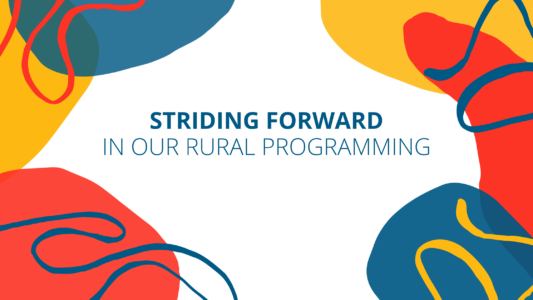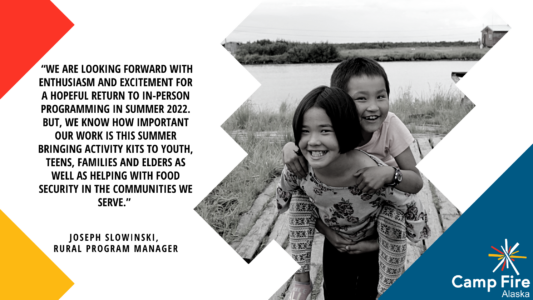Striding Forward in our Rural Programming

In 2020, the Rural Program reimagined and overcame the obstacles that COVID-19 threw our way.
We did not fail to adapt. We took that time to change, to grow, and to listen. We moved forward.
Now, in 2021, we are striding at new speeds as we have begun implementing a variety of changes to our overall programming in order to better serve each Rural community we work with in 2021 and moving forward. Included among these changes are Camp Fire’s two newest office Staff members: Joseph Slowinski, Rural Program Manager, and Marnie Stewart, Rural Program Operations Manager. Both having backgrounds in rural and community preservation, Joe and Marnie envision focusing the progress of the Rural Program on a few things:
nurturing culture, customization of curriculum, and workforce development.
Programming in 2021 and beyond is aimed to involve curriculum that nurtures and preserves cultural values, through continuing our partnerships with tribal councils and tribal organizations. Many of the activities in our shipments this year are designed to encourage Elder interaction to create pathways towards preserving language, stories, and wisdom. Our team also built activities into our Wellness Curriculum that allow the youth to dig into their roots and community values to come to their own individual conclusions about their identity. “Wearing the Other Shoe” is one of our new teen activities that involves interviewing an Elder in community and recording their stories. We’ve also included more recipes using traditional wild foods from Alaska Native Tribal Health Consortium’s Foods “We Alaskans Enjoy” recipe book. Included in our shipments will also be a list of 25 activities, called the 25 Sparks, which encourage exploration of the community and individual wellness for the months after our Camp Fire programming ends for the year.
We also recognize that Rural Alaska encompasses many different types of communities, cultures, and geographical differences. We are moving in the direction of customizing our curriculum for each community’s specific needs. Our partners and community contacts are working with us to develop ways to successfully adapt our current Camp Fire curriculum so that when we return in person, the activities are much more tailored to the people in each unique community.
One of the main progress points realized by adapting to COVID-19 realities is workforce development. When the COVID-19 pandemic hit, our local staffing increased from six hired in 2019 to 19 hired in 2020. In the future, we hope this trend continues as there are many benefits to having local staff working with youth in communities. It provides experience for those who want to work with youth and teens as well as supports the local economy. We are constantly reflecting on ways we can adapt the program to increase support for workforce development in the communities we serve.
We cannot wait for another summer of the Rural Alaska Program to begin and are enthusiastic to see our changes in action. For those in communities we serve, please reach-out to our Rural Manager, Joe Slowinski, at jslowinski@campfireak.org to discuss our hiring needs.
If you are looking for ways to get involved in Anchorage, contact our Rural Program Operations Manager, Marnie Stewart, at mstewart@campfireak.org to get more information on volunteer opportunities for this year’s program.

